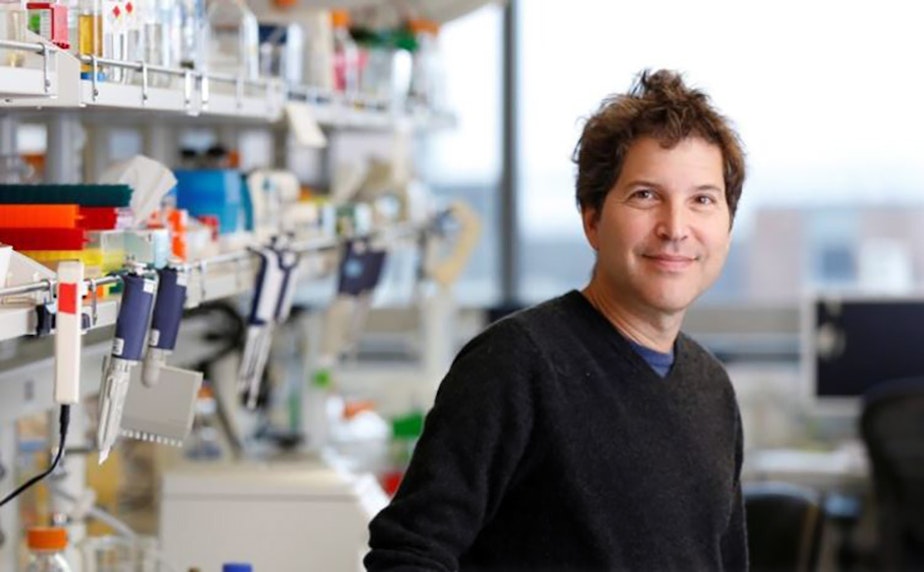UW biochemistry professor makes list of top 100 global health leaders

Time Magazine is out with a new annual honorific — the TIME100 Health list. It recognizes 100 people around the globe who are advancing progress in health, medicine, biomedical sciences, and related fields. University of Washington biochemistry professor David Baker made the list. He directs the UW Medicine Institute of Protein Design. He told KUOW’s Kim Malcolm about his work.
This interview has been edited for clarity.
Kim Malcolm: You said that for a long time protein design was on the “lunatic fringe” of biochemistry. And now you're on a Time 100 list. I'm wondering what your reaction was when you got that news.
David Baker: I think it's been exciting to see protein design move from something which was a purely academic kind of crazy pursuit to something that now involves making new vaccines, new medicines, and plastic-degrading enzymes, all kinds of things. The thing that's been really exciting has been that transformation from something that really was just kind of a crazy idea to something that's extremely applicable to many problems.
For people who aren't that familiar with protein design, tell us about what happens as you're designing new proteins.
Proteins are the miniature machines that carry out all the important functions in our bodies and in all living things. And all the proteins that we knew of up until very recently came down through millions or billions of years of evolution. And they solve the problems that were relevant during evolution. Now, we want to make new proteins to solve the problems that are around today.
Sponsored
For every problem we want to figure out, whether it's curing cancer, or neurodegenerative disease, or breaking down plastic, or capturing sunlight, we have to figure out what sort of protein would likely be able to do that job. Once we figured out the shape of a protein that would carry out that job, we have very powerful methods for creating proteins that have those shapes and hence should carry out those functions.
You're alluding to a range of really deep, intractable problems where this could be applied. Can you give us an example of one in particular, a big problem, and how you think protein design could really make a difference?
Well, I can give you examples of problems where solutions have already been found. For example, during the pandemic, my colleague Neil King at the Institute for Protein Design designed a Covid-19 vaccine that's now in use in humans. That was the first completely de novo design drug.
Now, we have new cancer therapeutics in clinical development. We're working on ways of speeding up chemical reactions, like plastic degradation. And we're working on new ways of capturing solar energy. So really, these things aren't science fiction, they're all happening now.
How confident are you that science will be able to regulate the development of these technologies?
Sponsored
As far as regulating DNA manufacturing, it's not really a science problem. It's more a government policy issue. And I think it's eminently doable.
I'm wondering if you ever feel overwhelmed at the scope of the work, or perhaps expectations people might have around this technology.
I think it's just very, very exhilarating, all the possibilities. And you know, I'm not doing this alone, I have absolutely brilliant people coming from all around the world here to the University of Washington to try and solve problems. There are a couple of hundred of the smartest people you've ever met here, who are just really passionate about making the world a better place. They're working on curing cancer, or climate change, or plastic degradation. It’s just super fun to be able to try and make a dent in all these really important problems and do it with these absolutely amazing, wonderful people.
Are there any new developments that you're particularly excited about?
The possibilities, they're really enormous. As far as medicine goes, a lot of medicines today are really blunt instruments. If you get chemotherapy, you get sick systemically. They aren't really anywhere near as precise as the interactions that occur in biology, which are really, really carefully regulated. So we're very excited about a new generation of medicines that will only act at the time and place in the body when they're needed, so could be much more efficacious.
Sponsored
Listen to the interview by clicking the play button above.




